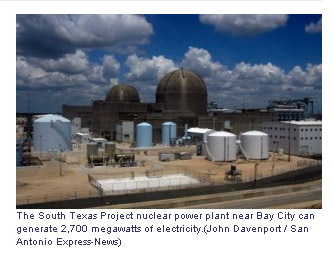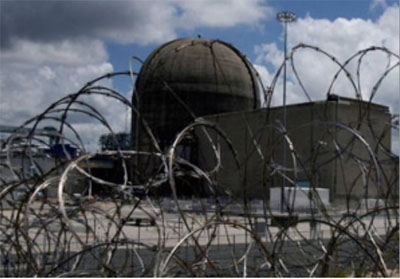Archive for the ‘South Texas Project’ Category
Fire at South Texas Project Nuclear Reactor Site – Just Before Re-licensing Hearing
Media Release:
January 11, 2013
Contact:
Karen Hadden, Sustainable Energy & Economic Development (SEED) Coalition, 512-797-8481
Susan Dancer, South Texas Association for Responsible Energy, 361-588-2143
Download this release in pdf format for printing.
Austin, TX A fire that shot 50 foot flames into the air erupted January 8th in the main transformer at the South Texas Project site near Bay City, Texas, about 90 miles southwest of Houston. Reactor 2, which was out of commission for five winter months in 2011-2012, has not been operating since the fire.
The fire occurred just one week prior to a hearing on re-licensing the two South Texas Project reactors, which will be held January 15th from 2-5 pm and 7-10 pm at the Bay City Civic Center, 201 Seventh St.
“Nuclear reactor fires and explosions create serious safety risks, and are of great concern to those of us who live close by. While the South Texas Project fire was burning I found myself trying to decide which of our rescue ranch horses we could take if my family had to evacuate due to radioactive releases, and which we would have to leave behind,” said Susan Dancer, who lives 8 miles from the reactors.
“The two South Texas nuclear reactors have been here for decades but Matagorda County still has no full-time, paid fire department. Who knows how long it would take for Houston teams to arrive if needed. Meantime, plant managers have been busy cutting personnel in hopes of higher profits, instead of putting safety first.” The STP reactors are owned by NRG, Austin Energy and San Antonio’s CPS Energy.
“Any nuclear reactor is at risk from fires, explosions, hurricanes, tornadoes, floods, earthquakes, lack of cooling water and terrorist attacks, as well as accidents due to human error and mechanical failure,” said Karen Hadden, Director of the Sustainable Energy and Economic Development (SEED) Coalition.
“This is like a used car deal – made fourteen years in advance. Why not wait until 2025 to see what shape the reactors are in before even considering re-licensing? The reactors, now 24 and 25 years old, are licensed to run 40 years – until 2027 and 2028. It’s time to plan for their replacement, not court disaster by giving aging reactors twenty additional years.”
The NRC Event report and hearing information are online at www.NukeFreeTexas.org.
###
Brief fire prompts shutdown of reactor at Bay City nuke plant
January 8, 2013
By Nolan Hicks
FuelFix Blog Houston Chronicle

A fire at the South Texas Project Electric Generating Station, the nuclear power plant about 90 miles southwest of Houston, shut down one of the plant’s two reactors Tuesday afternoon.
The fire broke out at 4:42 p.m. at the main transformer that feeds power from the reactor to the public power grid, and the reactor was shut down immediately, plant spokesman Buddy Eller said.
The fire was extinguished within 15 minutes, Eller said. He did not know when the reactor might be restarted.
Eller said the fire never threatened the reactor or other key components of the plant, no workers were hurt and the public was never endangered.
The South Texas Project is owned jointly by NRG Energy, Austin Energy and San Antonio’s municipal utility, CPS Energy.
This document contains copyrighted material whose use has not been specifically authorized by the copyright owner. SEED Coalition is making this article available in our efforts to advance understanding of ecological sustainability, human rights, economic democracy and social justice issues. We believe that this constitutes a "fair use" of the copyrighted material as provided for in section 107 of the US Copyright Law. If you wish to use this copyrighted material for purposes of your own that go beyond "fair use", you must obtain permission from the copyright owner.
Report: South Texas Project faces flood risk
Friday, October 19, 2012
By Jennifer Hiller
San Antonio Express-News

The South Texas Project nuclear power plant in Bay City. SA
The South Texas Project, which provides about a third of San Antonio’s electric power, is on a list of nuclear plants with a high risk of flooding-related failures.
A leaked July 2011 Nuclear Regulatory Commission report labeled “not for public release” deals with flood risk to plants across the country if dams break upstream.
The NRC posted a redacted version of the report to its website in March. But the environmental group Greenpeace obtained an un-redacted version and shared it with The Huffington Post, which first wrote about the full report Friday.
In response, a report Friday from the Union of Concerned Scientists says that the NRC document shows that, “34 reactors — one-third of the U.S. nuclear fleet — may face flooding hazards greater than they are designed to withstand, as a result of the failure of upstream dams. … The NRC has known about some of these problems for 15 years and has not effectively addressed them.”
CPS Energy, San Antonio’s city-owned utility, is an owner of the South Texas Project, along with Austin Energy and NRG Energy Inc.
The report comes in the wake of last year’s disaster at the Fukushima Daiichi nuclear power plant in Japan. In that case, an earthquake and tsunami led to a series of equipment failures and meltdowns, a massive evacuation and environmental damage.
The other U.S. plants deemed to be at flood risk were in Alabama, Arkansas, Louisiana, Minnesota, Nebraska, New Jersey, New York, North Carolina, Pennsylvania, Tennessee, South Carolina, Vermont, Virginia and Washington state.
“Failure of one or more dams upstream from a nuclear power plant may result in flood levels at a site that render essential safety systems inoperable,” the NRC report says. “For example, high floodwaters may fail all available power sources (e.g., offsite, emergency diesel, auxiliary), hinder operations, and damage other infrastructure resulting in station blackout and higher than acceptable risk.”
CPS officials declined to comment on the report and referred the matter to Buddy Eller, spokesman at STP.
Eller said that a flooding evaluation was done when the plant was constructed and found no issues.
But in the wake of Fukushima and because of STP’s above-ground reservoir, it is doing a flooding re-evaluation that will look at upstream dams. That report will go to the NRC early next year.
STP also is doing a seismic evaluation.
He said the industry and NRC have been looking at flooding and seismic risk in the wake of Fukushima.
“I think all the U.S. facilities are working with NRC to enhance the safety features of all the U.S. facilities,” Eller said.
CPS owns a 40 percent stake in the Bay City plant, which is about 11 miles inland from Matagorda Bay. NRC Energy of Texas owns 44 percent, while Austin Energy owns 16 percent.
STP units 1 and 2 generate 1,088 megawatts of power for CPS Energy customers.
STP Unit 1 went online in 1988 and Unit 2 in 1989, making them the sixth- and fourth-youngest units in the U.S.
jhiller(at)express-news.net
This document contains copyrighted material whose use has not been specifically authorized by the copyright owner. SEED Coalition is making this article available in our efforts to advance understanding of ecological sustainability, human rights, economic democracy and social justice issues. We believe that this constitutes a "fair use" of the copyrighted material as provided for in section 107 of the US Copyright Law. If you wish to use this copyrighted material for purposes of your own that go beyond "fair use", you must obtain permission from the copyright owner.
Foreign Ownership Could Halt Licensing of South Texas Project Nuclear Reactors; NRC Decision to Deny a License for Calvert Cliffs Bodes Well
For Immediate Release:
Sept. 4, 2012

Contact:
Karen Hadden, SEED Coalition, 512-797-8481
Brett Jarmer and Robert V. Eye, Attorneys, 785-234-4040
Download this release in pdf format for printing.
Austin, Texas On Thursday, the Nuclear Regulatory Commission denied an operating license to Unistar Nuclear Energy for its planned third reactor at Calvert Cliffs in Maryland because it is fully owned by France’s Électricité de France (EDF)-a foreign entity. Federal law prohibits a foreign entity from completely owning or controlling a U.S. nuclear plant. The company was given 60 days to find a U.S. partner, which it has been unable to do in the past two years, and if it fails to do so the license application will be fully terminated.
"This decision sets good precedent for us as opponents of two proposed reactors at the South Texas Project," said Karen Hadden, executive director of SEED Coalition, a group which has intervened in the licensing process, along with the South Texas Association for Responsible Energy and Public Citizen. "We hope to see clean, safe energy be developed in Texas instead of dangerous nuclear power. We must prevent Fukushima style disasters from happening here."
"From a regulatory perspective, the Calvert Cliffs decision shows that the prohibition against foreign ownership means what it says. This could be a major setback to the nuclear industry if foreign capital is unavailable for U.S. nuclear projects, said Robert Eye, attorney for the intervenors. "Domestic investors and lenders won’t put their money in nuclear projects without massive government subsidies and loan guarantees. Considering tight budgets, more government money for dangerous and expensive nuclear power doesn’t make sense when cheaper and safer renewable sources are available."
"Federal law is clear that foreign controlled corporations are not eligible to apply for a license to build and operate nuclear power plants. The evidence is that Toshiba is in control of the project and this precludes obtaining an NRC license for South Texas Project 3 & 4," said Brett Jarmer, an attorney also representing the intervenors.
"Foreign investment in U.S nuclear projects is not per se prohibited; but Toshiba is paying all the bills for the STP 3 & 4 project. This makes it difficult to accept that Toshiba doesn’t control the project," said Robert Eye.
Toshiba North America Engineering, or TANE, will assume exclusive, principal funding authority for the project, but they are a wholly owned subsidiary of Toshiba America, Inc, a Japanese corporation. Opponents contend that this makes them ineligible for licensing.
How did foreign ownership become a problem? New Jersey based NRG announced on April 19, 2011 that it would write down its investment in the development of South Texas Project units 3 & 4. Engineering work and pre-construction activities were halted, and NRG stated that Toshiba North America Engineering – TANE – would be responsible for funding ongoing costs to continue the licensing process. TANE is a subsidiary of Toshiba America, Inc., a Delaware corporation that is a wholly owned subsidiary of Toshiba Corporation, a Japanese company.
"National security and safety concerns justify NRC’s limits on foreign ownership and control of nuclear reactors," said Karen Hadden, Director of the Sustainable Energy and Economic Development (SEED) Coalition. "What if a foreign company was careless in running a U.S. reactor? International alliances are known to shift. What if a nation that is friendly toward the U.S. today becomes hostile in the future? Our own reactors could become a weapon to be turned against us to threaten civilians in a war against the U.S."
"Even if the reactors are operated by the South Texas Nuclear Operating Company, they will get their orders from foreign owners. What if their concerns are more about cost-cutting and less about safety?" asked Susan Dancer, President of the South Texas Association for Responsible Energy. "Japanese investors would have us believe that they can come to America and safely build, own and operate nuclear plants, and that we should not concern ourselves with passé laws and regulations, but the recent Fukushima disaster has demonstrated the flawed Japanese model of nuclear safety and the lack of protection afforded the Japanese people. In such an inherently dangerous industry, the American people deserve protection through federal law, including that our nuclear reactors are controlled by the people most concerned about our country: fellow Americans."
Foreign Ownership, Control or Domination policy is spelled out in the Atomic Energy Act (AEA) of 1954. In Section 103d it says that no license may be issued to an alien or any corporation or other entity if the Commission knows or has reason to believe it is owned, controlled, or dominated by an alien, a foreign corporation, or a foreign government.
The NRC interprets this to mean that these entities are not eligible to apply for and obtain a license. According to Commission guidance, an entity is under foreign ownership, control, or domination "whenever a foreign interest has the ‘power,’ direct or indirect, whether or not exercised, to direct or decide matters affecting the management or operations of the applicant." There is no set percentage point cut-off point used to determine foreign ownership. The factors that are considered include:
- The extent of foreign ownership
- Whether the foreign entity operates the reactors
- Whether there are interlocking directors and officers
- Whether there is access to restricted data
- Details of ownership of the foreign parent company
###
Government suspends nuclear license decisions
08/07/2012
Houston Chronicle
WASHINGTON – The Nuclear Regulatory Commission on Tuesday voted to halt final decisions on new and renewed licenses for reactors nationwide following a June court ruling that said the agency first must assess the environmental risks of storing radioactive waste.
The move could mean a potentially years-long delay of final decisions on as many as 19 pending nuclear power plant licenses, including a proposal to renew those for the South Texas Project nuclear plant near Bay City.
Spokesman David McIntyre stressed that the commission will continue reviewing applications until the point at which a final decision would be made.
"This isn’t saying that we’re not going to issue licenses for years; it’s saying, hold on, we need to take a breath and determine a path forward," McIntyre said. "The commission could come out with a path forward that says you can continue to do these things, but you have to address waste confidence in some way."
At issue is how the U.S. stores spent fuel rods while decades-old nuclear reactors continue to churn out power, without a clear plan on where to stash them permanently. The Obama administration ordered the Energy Department to rescind an application for building a long-term storage site at Yucca Mountain in Nevada.
In June, the Court of Appeals for the District of Columbia Circuit overturned the Nuclear Regulatory Commission’s "waste confidence" rule, which said spent fuel could be stored safely for 60 years or more at the site of existing plants. The court ruled that the agency was obligated to study the environmental risks of allowing that radioactive material to remain at reactors for decades.
The court also criticized the commission for failing to consider the environmental effects of not finding permanent off-site storage for nuclear waste at Yucca Mountain or anywhere else.
Full response weighed
The commission now is studying its full response, including possibly launching an environmental impact study that would span years before a new waste confidence rule could be made final.
In an order issued Tuesday, the commission said it would give the public an opportunity to comment on its decisions, including the breadth of any future environmental reviews.
Overdue, activists say
Nuclear foes and environmental activists who challenged the waste storage rule cheered the move, saying an environmental assessment of spent fuel storage and disposal is overdue.
"That study should have been done years ago, but NRC just kept kicking the can down the road," said attorney Diane Curran, who represented some of the groups that brought the case.
Existing licenses for the two units at the South Texas nuclear plant are set to expire in 2027 and 2028. In October 2010, the South Texas Project Nuclear Operating Co., asked the NRC to renew the licenses.
That kicked off a long multiyear review process slated to end with a final decision in mid-2013.
The two units at the plant are pressurized-water nuclear reactors.
San Antonio’s city-owned utility, CPS Energy, owns the South Texas Project along with Austin Energy and NRG Energy.
jennifer.dlouhy(at)chron.com
This document contains copyrighted material whose use has not been specifically authorized by the copyright owner. SEED Coalition is making this article available in our efforts to advance understanding of ecological sustainability, human rights, economic democracy and social justice issues. We believe that this constitutes a "fair use" of the copyrighted material as provided for in section 107 of the US Copyright Law. If you wish to use this copyrighted material for purposes of your own that go beyond "fair use", you must obtain permission from the copyright owner.


